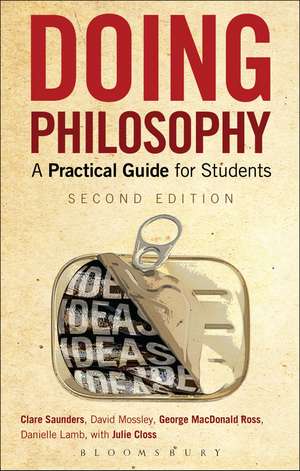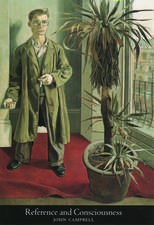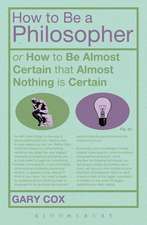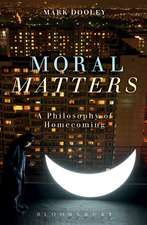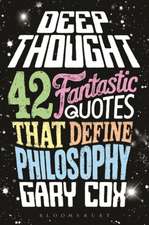Doing Philosophy: A Practical Guide for Students
Autor Danielle Lamb, David Mossley, George MacDonald Ross, Dr Clare Saundersen Limba Engleză Paperback – 31 oct 2012
Preț: 172.64 lei
Preț vechi: 199.66 lei
-14% Nou
Puncte Express: 259
Preț estimativ în valută:
33.06€ • 34.07$ • 27.70£
33.06€ • 34.07$ • 27.70£
Carte tipărită la comandă
Livrare economică 22 februarie-08 martie
Preluare comenzi: 021 569.72.76
Specificații
ISBN-13: 9781441173041
ISBN-10: 1441173048
Pagini: 256
Dimensiuni: 138 x 216 x 18 mm
Greutate: 0.36 kg
Ediția:Revised
Editura: Bloomsbury Publishing
Colecția Bloomsbury Academic
Locul publicării:London, United Kingdom
ISBN-10: 1441173048
Pagini: 256
Dimensiuni: 138 x 216 x 18 mm
Greutate: 0.36 kg
Ediția:Revised
Editura: Bloomsbury Publishing
Colecția Bloomsbury Academic
Locul publicării:London, United Kingdom
Caracteristici
Equips students with the skills and strategies necessary to succeed as a philosophy undergraduate.
Notă biografică
Clare Saunders is Academic Practice Advisor at the University of Birmingham, UK. She has a PhD in Philosophy and has taught a wide range of philosophy courses. David Mossley is an independent consultant specialising in the application of philosophy to education and management. He has been a Senior Adviser at the Centre Manager at the Subject Centre for Philosophical and Religious Studies. He has an MBA and PhD in Philosophy, and has taught a wide range of philosophy courses. George MacDonald Ross is former Director of the Subject Centre for Philosophical and Religious Studies, and Visiting Senior Lecturer in Philosophy at the University of Leeds, UK. In 2006 he was awarded a National Teaching Fellowship for his contribution to the improvement of learning and teaching in higher education in the UK. Danielle Lamb is former Project Manager of the Subject Centre for Philosophical and Religious Studies, UK. She has an MA in Philosophy and has tutored undergraduates on a range of philosophy modules. She is now a researcher in psychology with a particular interest in philosophy of psychology.
Cuprins
Introduction \ 1. Studying Philosophy\ 1.1 What is philosophy? \ 1.2 Why study philosophy? \ 1.3 What does studyingphilosophy involve? \ 1.4 Summary \ 2. Reading Philosophy \ 2.1 What toread \ 2.2 How to read \ 2.3 Summary \ 3. Taking Notes \ 3.1 Why isnote-taking important? \ 3.2 Content- what should I write down? \ 3.3 Method-how should I go about taking notes? \ 3.4 An example of effective note taking 3.5 Tailoring your methods to your context \ 3.6 Making best use of your notes\ 3.7 Summary \ 4. Discussion \ 4.1 The value of discussion \ 4.2Discussion seminars \ 4.3 Other forms of discussion \ 4.4 Summary \ 5.Writing Philosophy \ 5.1 What to write \ 5.2 How to Write 5.3 Example assignments \ 5.4 Assessment and feedback \ 5.5 Summary \ 6.Resources \ 6.1 Library resources \ 6.2 Internet resources \ 6.3 Supportsystems \ 6.4 Some useful philosophical terms \ Index
Recenzii
Anyone coming to the study of philosophy at university for the first time will find help here, and some more advanced students might gain from reading it, too...by offering a clear account of some of the barriers to successful engagement with philosophical texts and questions, and helping to overcome them, [the authors] have done a real service.
'This is an excellent book, and I'll definitely be advising my first-year Philosophy students to buy it. Doing Philosophy basically tells the student beginning philosophy at university everything they need to know. The topics include finding resources, reading philosophy, plagiarism, referencing, taking notes, seminar discussions, and more. In particular, I think the chapter on writing philosophy - and especially the examples of essay questions, together with advice on how to tackle them - will be hugely useful. It's easy to forget just how different writing a philosophy essay is to anything else most beginning philosophy students have done; even (perhaps especially) those who have studied philosophy at A-level. The authors guide the student through each question, showing them how to find and filter relevant information, how to make sure they stick to the question, and how to maintain a properly philosophical approach to the topic. I'm sure beginning students - and their teachers - will be very grateful. Professor Helen Beebee, University of Birmingham, UK.
"...well worth a read for those either preparing to or currently studying philosophy for the first time. Indeed, it will help many students to understand that, as the authors recognise, 'the focus of your philosophical study will be to learn not what to believe, but how to think.'" Emma L Williams, Philosopher in Residence, Rugby School, UK
'This is an excellent book, and I'll definitely be advising my first-year Philosophy students to buy it. Doing Philosophy basically tells the student beginning philosophy at university everything they need to know. The topics include finding resources, reading philosophy, plagiarism, referencing, taking notes, seminar discussions, and more. In particular, I think the chapter on writing philosophy - and especially the examples of essay questions, together with advice on how to tackle them - will be hugely useful. It's easy to forget just how different writing a philosophy essay is to anything else most beginning philosophy students have done; even (perhaps especially) those who have studied philosophy at A-level. The authors guide the student through each question, showing them how to find and filter relevant information, how to make sure they stick to the question, and how to maintain a properly philosophical approach to the topic. I'm sure beginning students - and their teachers - will be very grateful. Professor Helen Beebee, University of Birmingham, UK.
"...well worth a read for those either preparing to or currently studying philosophy for the first time. Indeed, it will help many students to understand that, as the authors recognise, 'the focus of your philosophical study will be to learn not what to believe, but how to think.'" Emma L Williams, Philosopher in Residence, Rugby School, UK
